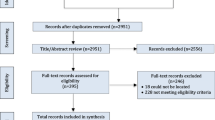Abstract
Purpose
With the recognition of addiction medicine as a medical subspecialty by the American Board of Medical Specialties (ABMS) in 2016, fellowship training programs for physicians have sprung up across the country at a rapid pace. As of this writing, 70 such fellowship programs exist (including in Canada and Puerto Rico), with most accredited by the Accreditation Council for Graduate Medical Education (ACGME) or in the process of accreditation. This review explores the significant changes that have occurred already due to these training programs and the potential future implications for the field of addiction medicine.
Recent Findings
Little published information is available on the impact of fellowship-trained addiction specialists on the field or on the treatment of addictions as the accreditation was a recent development.
Summary
While there is little published information about the impact that ACGME accreditation has had on the field, this article uses existing evidence to suggest areas that accreditation may impact.
Similar content being viewed by others
References and Recommended Reading
Papers of particular interest, published recently, have been highlighted as: • Of importance •• Of major importance
Substance Abuse and Mental Health Services Administration. (2019). Key substance use and mental health indicators in the United States: Results from the 2018 National Survey on Drug Use and Health (HHS Publication No. PEP19–5068, NSDUH Series H-54). Rockville, MD: Center for Behavioral Health Statistics and Quality, Substance Abuse and Mental Health Services Administration. Retrieved from https://www.samhsa.gov/data/Annual nationwide survey that provides critical national and state-level data on both substance use and mental health conditions and can help identify areas to direct treatment and prevention.
The President’s Commission on Combating Drug Addiction and the Opioid Crisis. (2017).
Tontchev GV, Housel TR, Callahan JF, Kunz KB, Miller MM, Blondell RD. Specialized training on addictions for physicians in the United States. Subst Abuse. 2011;32:84–92. https://doi.org/10.1080/08897077.2011.555702.
The Need for Addiction Medicine Physicians and for Addiction Medicine Residency Training Programs: A Report of the American Board of Addiction Medicine Foundation. American Board of Addiction Medicine Foundation; Bethesda MD: 2009.
Katcher BS. Benjamin Rush's educational campaign against hard drinking. Am J Public Health. 1993;83(2):273–81. https://doi.org/10.2105/ajph.83.2.273.
Koob GF, Volkow ND. Neurocircuitry of addiction [published correction appears in Neuropsychopharmacology. 2010 Mar;35(4):1051]. Neuropsychopharmacology. 2010;35(1):217–38. https://doi.org/10.1038/npp.2009.110.
Miller N, Sheppard L, Magen J. Barriers to improving education and training in addiction medicine. Psychiatr Ann. 2001;31:649–56. https://doi.org/10.3928/0048-5713-20011101-06.
Soyka M, Gorelick DA. Why should addiction medicine be an attractive field for young physicians? Addiction. 2009;104:169–72.
Englander H, Dobbertin K, Lind BK, et al. Inpatient addiction medicine consultation and post-hospital substance use disorder treatment engagement: a propensity-matched analysis. J Gen Intern Med 2019 Aug 13 https://doi.org/10.1007/s11606-019-05251-9
Reeve R, Arora S, Butler K, Viney R, Burns L, Goodall S, et al. Evaluating the impact of hospital based drug and alcohol consultation liaison services. Reeve J Subs Abuse Treat. 2016Sep;68:36–45. https://doi.org/10.1016/j.jsat.2016.05.008.
Brooklyn JR, Sigmon SC. Vermont hub-and-spoke model of care for opioid use disorder: development, implementation, and impact. J Addict Med. 2017;11(4):286–92. https://doi.org/10.1097/ADM.0000000000000310.
Barry CL, McGinty EE, Pescosolido BA, Goldman HH. Stigma, discrimination, treatment effectiveness, and policy: public views about drug addiction and mental illness. Psychiatr Serv. 2014;65(10):1269–72. https://doi.org/10.1176/appi.ps.201400140.
McGinty EE, Goldman HH, Pescosolido B, Barry CL. Portraying mental illness and drug addiction as treatable health conditions: effects of a randomized experiment on stigma and discrimination. Soc Sci Med. 2015;126:73–85. https://doi.org/10.1016/j.socscimed.2014.12.010.
Keyes KM, Hatzenbuehler ML, McLaughlin KA, Link B, Olfson M, Grant BF, et al. Stigma and treatment for alcohol disorders in the United States. Am J Epidemiol. 2010;172(12):1364–72. https://doi.org/10.1093/aje/kwq304.
van Boekel LC, Brouwers EP, van Weeghel J, Garretsen HF. Stigma among health professionals towards patients with substance use disorders and its consequences for healthcare delivery: systematic review. Drug Alcohol Depend. 2013;131(1–2):23–35. https://doi.org/10.1016/j.drugalcdep.2013.02.018.
CASA Columbia Addiction medicine: closing the gap between science and practice [Internet]. New York (NY): The National Center on Addiction and Substance Abuse (CASA) at Columbia University; 2012. [cited 2019 Sept 22].
Antman KH, Berman HA, Flotte TR, Flier J, Dmitri DM, Bharel M. Developing Core Competencies for the Prevention and Management of Prescription Drug Misuse: A Medical Education Collaboration in Massachusetts. Acad Med 2016;91:1348–1351. Important review of medical curriculum and addiction didactics with the development of core competencies with the goal to enhance education in prevention and treatment of substance use disorders.
Author information
Authors and Affiliations
Corresponding author
Ethics declarations
Conflict of Interest
Dr. McNally declares no conflict of interest.
Human and Animal Rights and Informed Consent
This article does not contain any studies with human or animal subjects performed by any of the authors.
Additional information
Publisher’s Note
Springer Nature remains neutral with regard to jurisdictional claims in published maps and institutional affiliations.
This article is part of the Topical Collection on Substance Use Disorders
Rights and permissions
About this article
Cite this article
Nishiaoki, M., McNally, D., Bey, R.M. et al. New ACGME-Accredited Addiction Medicine Fellowship Programs and Their Impact on the Field. Curr Treat Options Psych 7, 1–8 (2020). https://doi.org/10.1007/s40501-020-00200-4
Published:
Issue Date:
DOI: https://doi.org/10.1007/s40501-020-00200-4



